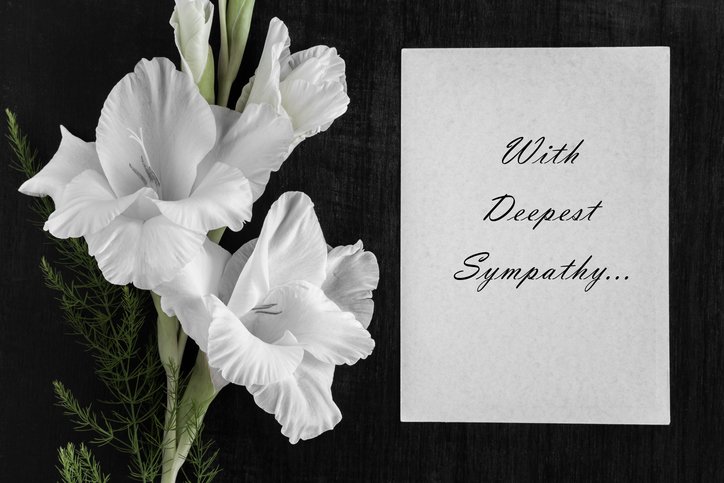How to Write a Meaningful Condolence Message
When someone you know is grieving, it can be difficult to know exactly what to say to them. You may be afraid of writing too much or too little or getting your messaging wrong altogether.
The truth is, there isn’t one perfect way to write a sympathy message.
Letting someone know that you are thinking about them during their time of sorrow is an extremely meaningful gesture. If you need some structure prior to writing your words of condolence, consider the guidelines below.

Try to embrace your discomfort.
Hem and haw over writing the “perfect” message and you risk never writing or sending your condolence letter at all. Don’t allow feeling uncomfortable to keep you from sharing your heartfelt sympathies with those you care about! When you sit down to compose your note, it can help to acknowledge the situation. You might even include the phrase, “I’m at a loss for words” or “I don’t know how to say this but I want to write and let you know I’m thinking of you.” Writing these words can help you to overcome your uneasiness over what to say. Remember that the loss is also new to the person who is grieving. There may not be specific words that they need to hear, rather knowing that others care about them in their time of sorrow might mean the world to them.
Include the names of each of the bereaved.
When you’re sending a sympathy card or a condolence letter, make an effort to include the names of each person in the household. Doing so acknowledges the individual sorrow of each person. If you’re writing a note to a co-worker and are unsure of their spouse’s or children’s names, it’s OK to refer to them as “and family.”
- Dear Michael, Sheena, and Michael Jr.,
- Dear Michael and family,
Include the name of the deceased.
Seeing a loved one’s name in writing after they have passed on can be very healing for the bereaved. This little touch can make your gesture even more meaningful. If you’re unsure of the deceased’s name, you can always look for an obituary, contact the funeral home, or ask a mutual acquaintance.
- I was filled with sadness upon hearing about Roberta’s accident.
- Your mother, Roberta, was a special person.
- We were so sorry to hear about your mother Roberta’s passing. We know how much she meant to you.
Let them know that you share in their grief.
Coping with the death of a loved one can sometimes cause the bereaved to feel isolated in their grief. Acknowledging and sharing in their sorrow can help them to feel less alone.
- We’re going to miss her, too.
- This loss is felt by the entire congregation.
Include any loving memories that you may have about the deceased.
Sharing a story or mentioning a special quality about deceased can be very meaningful to their surviving friends and family members. Think back on any encounters that you have had with them, no matter how brief.
- I’ll never forget hearing Roberta’s beautiful voice during the Christmas pageant.
- She was a wonderful woman and a talented pianist.
If you didn’t know the deceased well, you can still make it personal.
- I will always remember Roberta’s warm smile and infectious laugh from when I met her at your wedding.
- While I never got to meet your mother, I will always cherish the stories that you told me about her.
If possible, deliver the note in person or put it in the mail within two weeks.
Funeral etiquette dictates that it's OK to bring a card to a repast or homegoing. If you’re planning to mail your condolence letter, it's best to send it within two weeks of the person’s passing. If you do not make it within this timeframe, don’t fret. It’s never too late to express your heartfelt feelings of sympathy. The recipient will appreciate knowing that they’re being thought of and your card may come at a time when they need it most.
Finally, if you are sending a pre-written sympathy card, include a handwritten note.
Hallmark and the like are skilled at providing wording when you don’t know what to say. Yet, it’s always nice to include a handwritten note inside of the card. Your note doesn’t need to be super lengthy or detailed. A thoughtful message can be brief.
- We’ll never forget your mother and are wishing you peace. With love and sympathy, The Smiths
We hope these guidelines are helpful to you.
Overall, remember that your condolence letter or sympathy note doesn’t need to be perfect to have meaning. The best messages are those that come from the heart.
If you need additional pointers regarding funeral etiquette, how to write an obituary, or when to express your condolences, please reach out to us. Our caring team is always happy to assist.
About Vaughn Greene Funeral Services: For more than 20 years, Vaughn Greene Funeral Services has been providing a ministry of care to Baltimore’s African American community. As a leading local, minority- and family-owned provider, we promise to provide our highest level of service and respect to families who entrust us to honor their loved one. For more information, please call us at 410.655.0015 or visit us online at https://vaughncgreene.com/.







Comments